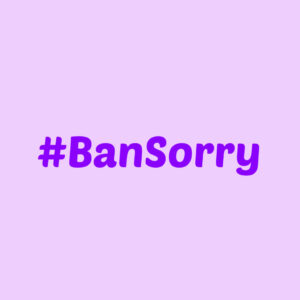Sorry is such an emotive word, and is one that my clients regularly say. Until I ban the word from our sessions! Whether they have made a mistake, although this is a training session, are asking a question or even asking to have a glass of water, any request is preceded by “Sorry”. In the workplace, individuals will interrupt a conversation with “Sorry”; start a telephone conversation with “Sorry but”. If you don’t hear what someone says “Sorry?” is the response. At home, interrupting a partner immersed in a World Cup match on the TV, is started with “Sorry”.
This isn’t exclusively a female trait, however, women are more likely than men to say ‘Sorry’ in a conversation, or to start a conversation in this way. So I was really interested to see that Sheryl Sandberg of Facebook, and Lean In, has joined the debate on using “Sorry”. A Youtube video has been created to highlight this.
So why is ‘Sorry’ not appropriate in certain situations? To misquote the song “Sorry is the easiest word to say” for some people! The very nature of the word is that it is an apology. It is an apology for being present; for speaking to someone; for interrupting someone; for asking for some help; apologising even though someone bumps into you or moves into your personal space.
This is a trait particularly, although not exclusively female. And the use of an apology word, rather than a positive one could be construed as a negative weak comment. For example, “Sorry, but could I ask you a question?” immediately implies you are apologising for asking a question. “Sorry but could I have a word” implies you have to apologise for asking. “Sorry” when someone moves into YOUR personal space.. The list goes on. It implies you don’t value yourself and don’t feel you have a right to speak up.
So here’s the deal. You don’t have to apologise. You don’t have to say sorry when you are asking for help, wanting to say something or even ask a question. You have a right to ask questions, ask for help, speak and not apologise for other people.
Here some examples of how you could change your language to be more empowering.
Instead of “Sorry but could I have a word”, change to “Could I have a word”
“Sorry to interrupt you but…” to “Hi David, do you have a moment”.
“Sorry, but could you just take the baby whilst I make his lunch” to “Right, you take the baby and I’ll make his lunch”.
“Sorry, but do you mind if I grab a coffee” to “Do you mind if I grab a coffee and would you like one too?”
“Sorry, I’d better take this call”, to “Excuse me, I’ll need to take this call”.
We all use sorry too much, but let’s see if we can find better ways to express ourselves and then we’ll empower ourselves!
#bansorry
If you like this blog, why not share it with your friends, colleagues and acquaintances.
To receive more articles and ideas, download our free Top Tips to being a Superstar Communicator



